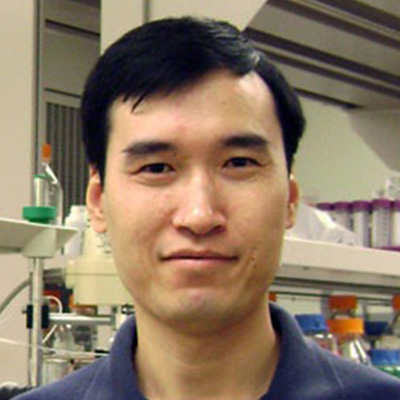Biography
Michael B. Gorin, MD, PhD, is the currently the first recipient of the Harold and Pauline Price Chair in Ophthalmology and Professor of Ophthalmology in the Retina and Vision Science Divisions in the Department of Ophthalmology at the David Geffen School of Medicine ? UCLA and Jules Stein Eye Institute. He also holds an appointment in the Vision Research Division at the Jules Stein Eye Institute. Dr. Gorin obtained his medical and doctor of philosophy degrees from the University of Pennsylvania at Philadelphia and completed his internship at the Center for Health Sciences at the University of California at Los Angeles (UCLA). He stayed on at UCLA for postdoctoral research fellowship and ophthalmology residency training at the Jules Stein Eye Institute, and then finished a clinical fellowship in Medical Retina and Genetics at Moorfields Eye Hospital in London, England. Dr. Gorin returned to UCLA from the University of Pittsburgh, where he served as Assistant Vice Chancellor for Strategic Initiatives for the six graduate health sciences schools. He joined the Pittsburgh campus in 1990, rising to the rank of Professor in the Department of Ophthalmology in the School of Medicine and the Department of Human Genetics in the Graduate School of Public Health and serving as interim chair for both departments. He was founding director of the Center for Human Genetics and a founding senior associate of the Center for Biomedical Informatics at the University. Throughout his 16 years in Pittsburgh, he has provided clinical care on a regular basis in medical retina particularly in the fields of hereditary disorders, retinal diagnostics, drug-related ocular toxicity, and ophthalmic genetics. During 2005-2007, he was named one of the top physicians in the United States by Castle Connolly Medical Ltd. As a full-time faculty member at the Jules Stein Eye Institute, Dr. Gorin divides his time between patient care for diseases of the retina, research into the genetics of inherited eye disorders and training young ophthalmologists and medical students.
Publications
A selected list of publications:
Fritsche Lars G, Chen Wei, Schu Matthew, Yaspan Brian L, Yu Yi, Thorleifsson Gudmar, Zack Donald J, Arakawa Satoshi, Cipriani Valentina, Ripke Stephan, Igo Robert P, Buitendijk Gabriëlle H S, Sim Xueling, Weeks Daniel E, Guymer Robyn H, Merriam Joanna E, Francis Peter J, Hannum Gregory, Agarwal Anita, Armbrecht Ana Maria, Audo Isabelle, Aung Tin, Barile Gaetano R, Benchaboune Mustapha, Bird Alan C, Bishop Paul N, Branham Kari E, Brooks Matthew, Brucker Alexander J, Cade William H, Cain Melinda S, Campochiaro Peter A, Chan Chi-Chao, Cheng Ching-Yu, Chew Emily Y, Chin Kimberly A, Chowers Itay, Clayton David G, Cojocaru Radu, Conley Yvette P, Cornes Belinda K, Daly Mark J, Dhillon Baljean, Edwards Albert O, Evangelou Evangelos, Fagerness Jesen, Ferreyra Henry A, Friedman James S, Geirsdottir Asbjorg, George Ronnie J, Gieger Christian, Gupta Neel, Hagstrom Stephanie A, Harding Simon P, Haritoglou Christos, Heckenlively John R, Holz Frank G, Hughes Guy, Ioannidis John P A, Ishibashi Tatsuro, Joseph Peronne, Jun Gyungah, Kamatani Yoichiro, Katsanis Nicholas, N Keilhauer Claudia, Khan Jane C, Kim Ivana K, Kiyohara Yutaka, Klein Barbara E K, Klein Ronald, Kovach Jaclyn L, Kozak Igor, Lee Clara J, Lee Kristine E, Lichtner Peter, Lotery Andrew J, Meitinger Thomas, Mitchell Paul, Mohand-Saïd Saddek, Moore Anthony T, Morgan Denise J, Morrison Margaux A, Myers Chelsea E, Naj Adam C, Nakamura Yusuke, Okada Yukinori, Orlin Anton, Ortube M Carolina, Othman Mohammad I, Pappas Chris, Park Kyu Hyung, Pauer Gayle J T, Peachey Neal S, Poch Olivier, Priya Rinki Ratna, Reynolds Robyn, Richardson Andrea J, Ripp Raymond, Rudolph Guenther, Ryu Euijung, Sahel José-Alain, Schaumberg Debra A, Scholl Hendrik P N, Schwartz Stephen G, Scott William K, Shahid Humma, Sigurdsson Haraldur, Silvestri Giuliana, Sivakumaran Theru A, Smith R Theodore, Sobrin Lucia, Souied Eric H, Stambolian Dwight E, Stefansson Hreinn, Sturgill-Short Gwen M, Takahashi Atsushi, Tosakulwong Nirubol, Truitt Barbara J, Tsironi Evangelia E, Uitterlinden André G, van Duijn Cornelia M, Vijaya Lingam, Vingerling Johannes R, Vithana Eranga N, Webster Andrew R, Wichmann H-Erich, Winkler Thomas W, Wong Tien Y, Wright Alan F, Zelenika Diana, Zhang Ming, Zhao Ling, Zhang Kang, Klein Michael L, Hageman Gregory S, Lathrop G Mark, Stefansson Kari, Allikmets Rando, Baird Paul N, Gorin Michael B, Wang Jie Jin, Klaver Caroline C W, Seddon Johanna M, Pericak-Vance Margaret A, Iyengar Sudha K, Yates John R W, Swaroop Anand, Weber Bernhard H F, Kubo Michiaki, Deangelis Margaret M, Léveillard Thierry, Thorsteinsdottir Unnur, Haines Jonathan L, Farrer Lindsay A, Heid Iris M, Abecasis Gonçalo R, Abecasis Gonçalo R
Seven new loci associated with age-related macular degeneration Nature genetics, 2013; 45(4): 433-9, 439e1-2.
Sofat Reecha, Casas Juan P, Webster Andrew R, Bird Alan C, Mann Samantha S, Yates John R W, Moore Anthony T, Sepp Tiina, Cipriani Valentina, Bunce Catey, Khan Jane C, Shahid Humma, Swaroop Anand, Abecasis Gonçalo, Branham Kari E H, Zareparsi Sepideh, Bergen Arthur A, Klaver Caroline C W, Baas Dominique C, Zhang Kang, Chen Yuhong, Gibbs Daniel, Weber Bernhard H F, Keilhauer Claudia N, Fritsche Lars G, Lotery Andrew, Cree Angela J, Griffiths Helen L, Bhattacharya Shomi S, Chen Li L, Jenkins Sharon A, Peto Tunde, Lathrop Mark, Leveillard Thierry, Gorin Michael B, Weeks Daniel E, Ortube Maria Carolina, Ferrell Robert E, Jakobsdottir Johanna, Conley Yvette P, Rahu Mati, Seland Johan H, Soubrane Gisele, Topouzis Fotis, Vioque Jesus, Tomazzoli Laura, Young Ian, Whittaker John, Chakravarthy Usha, de Jong Paulus T V M, Smeeth Liam, Fletcher Astrid, Hingorani Aroon D
Complement factor H genetic variant and age-related macular degeneration: effect size, modifiers and relationship to disease subtype International journal of epidemiology, 2012; 41(1): 250-62.
Webb Tom R, Parfitt David A, Gardner Jessica C, Martinez Ariadna, Bevilacqua Dalila, Davidson Alice E, Zito Ilaria, Thiselton Dawn L, Ressa Jacob H C, Apergi Marina, Schwarz Nele, Kanuga Naheed, Michaelides Michel, Cheetham Michael E, Gorin Michael B, Hardcastle Alison J
Deep intronic mutation in OFD1, identified by targeted genomic next-generation sequencing, causes a severe form of X-linked retinitis pigmentosa (RP23) Human molecular genetics, 2012; 21(16): 3647-54.
Spencer Kylee L, Olson Lana M, Schnetz-Boutaud Nathalie, Gallins Paul, Wang Gaofeng, Scott William K, Agarwal Anita, Jakobsdottir Johanna, Conley Yvette, Weeks Daniel E, Gorin Michael B, Pericak-Vance Margaret A, Haines Jonathan L
Dissection of chromosome 16p12 linkage peak suggests a possible role for CACNG3 variants in age-related macular degeneration susceptibility Investigative ophthalmology & visual science, 2011; 52(3): 1748-54.
McKay Gareth J, Patterson Chris C, Chakravarthy Usha, Dasari Shilpa, Klaver Caroline C, Vingerling Johannes R, Ho Lintje, de Jong Paulus T V M, Fletcher Astrid E, Young Ian S, Seland Johan H, Rahu Mati, Soubrane Gisele, Tomazzoli Laura, Topouzis Fotis, Vioque Jesus, Hingorani Aroon D, Sofat Reecha, Dean Michael, Sawitzke Julie, Seddon Johanna M, Peter Inga, Webster Andrew R, Moore Anthony T, Yates John R W, Cipriani Valentina, Fritsche Lars G, Weber Bernhard H F, Keilhauer Claudia N, Lotery Andrew J, Ennis Sarah, Klein Michael L, Francis Peter J, Stambolian Dwight, Orlin Anton, Gorin Michael B, Weeks Daniel E, Kuo Chia-Ling, Swaroop Anand, Othman Mohammad, Kanda Atsuhiro, Chen Wei, Abecasis Goncalo R, Wright Alan F, Hayward Caroline, Baird Paul N, Guymer Robyn H, Attia John, Thakkinstian Ammarin, Silvestri Giuliana
Evidence of association of APOE with age-related macular degeneration: a pooled analysis of 15 studies Human mutation, 2011; 32(12): 1407-16.
Choi Daniel Y, Ortube Maria Carolina, McCannel Colin A, Sarraf David, Hubschman Jean-Pierre, McCannel Tara A, Gorin Michael B
Sustained elevated intraocular pressures after intravitreal injection of bevacizumab, ranibizumab, and pegaptanib Retina (Philadelphia, Pa.), 2011; 31(6): 1028-35.
Charles Bashira A, Conley Yvette P, Chen Guanjie, Miller Rachel G, Dorman Janice S, Gorin Michael B, Ferrell Robert E, Sereika Susan M, Rotimi Charles N, Orchard Trevor J
Variants of the adenosine A(2A) receptor gene are protective against proliferative diabetic retinopathy in patients with type 1 diabetes Ophthalmic research, 2011; 46(1): 1-8.
McKay Gareth J, Silvestri Giuliana, Chakravarthy Usha, Dasari Shilpa, Fritsche Lars G, Weber Bernhard H, Keilhauer Claudia N, Klein Michael L, Francis Peter J, Klaver Caroline C, Vingerling Johannes R, Ho Lintje, De Jong Paulus T D V, Dean Michael, Sawitzke Julie, Baird Paul N, Guymer Robyn H, Stambolian Dwight, Orlin Anton, Seddon Johanna M, Peter Inga, Wright Alan F, Hayward Caroline, Lotery Andrew J, Ennis Sarah, Gorin Michael B, Weeks Daniel E, Kuo Chia-Ling, Hingorani Aroon D, Sofat Reecha, Cipriani Valentina, Swaroop Anand, Othman Mohammad, Kanda Atsuhiro, Chen Wei, Abecasis Goncalo R, Yates John R, Webster Andrew R, Moore Anthony T, Seland Johan H, Rahu Mati, Soubrane Gisele, Tomazzoli Laura, Topouzis Fotis, Vioque Jesus, Young Ian S, Fletcher Astrid E, Patterson Chris C
Variations in apolipoprotein E frequency with age in a pooled analysis of a large group of older people American journal of epidemiology, 2011; 173(12): 1357-64.
Chen Wei, Stambolian Dwight, Edwards Albert O, Branham Kari E, Othman Mohammad, Jakobsdottir Johanna, Tosakulwong Nirubol, Pericak-Vance Margaret A, Campochiaro Peter A, Klein Michael L, Tan Perciliz L, Conley Yvette P, Kanda Atsuhiro, Kopplin Laura, Li Yanming, Augustaitis Katherine J, Karoukis Athanasios J, Scott William K, Agarwal Anita, Kovach Jaclyn L, Schwartz Stephen G, Postel Eric A, Brooks Matthew, Baratz Keith H, Brown William L, Brown William L, Brucker Alexander J, Orlin Anton, Brown Gary, Ho Allen, Regillo Carl, Donoso Larry, Tian Lifeng, Kaderli Brian, Hadley Dexter, Hagstrom Stephanie A, Peachey Neal S, Klein Ronald, Klein Barbara E K, Gotoh Norimoto, Yamashiro Kenji, Ferris Iii Frederick, Fagerness Jesen A, Reynolds Robyn, Farrer Lindsay A, Kim Ivana K, Miller Joan W, Cortón Marta, Carracedo Angel, Sanchez-Salorio Manuel, Pugh Elizabeth W, Doheny Kimberly F, Brion Maria, Deangelis Margaret M, Weeks Daniel E, Zack Donald J, Chew Emily Y, Heckenlively John R, Yoshimura Nagahisa, Iyengar Sudha K, Francis Peter J, Katsanis Nicholas, Seddon Johanna M, Haines Jonathan L, Gorin Michael B, Abecasis Gonçalo R, Swaroop Anand
Genetic variants near TIMP3 and high-density lipoprotein-associated loci influence susceptibility to age-related macular degeneration Proceedings of the National Academy of Sciences of the United States of America, 2010; 107(16): 7401-6.
Aldave Anthony J, Rosenwasser George O D, Yellore Vivek S, Papp Jeanette C, Sobel Eric M, Pham Michele N, Chen Michael C, Dandekar Sugandha, Sripracha Ram, Rayner Sylvia A, Sassani Joseph W, Gorin Michael B
Linkage of posterior amorphous corneal dystrophy to chromosome 12q21.33 and exclusion of coding region mutations in KERA, LUM, DCN, and EPYC Investigative ophthalmology & visual science, 2010; 51(8): 4006-12.
Aldave Anthony J, Yellore Vivek S, Vo Rosalind C, Kamal Khairidzan M, Rayner Sylvia A, Plaisier Christopher L, Chen Michael C, Damani Mausam R, Pham Michele N, Gorin Michael B, Sobel Eric, Papp Jeanette
Exclusion of positional candidate gene coding region mutations in the common posterior polymorphous corneal dystrophy 1 candidate gene interval Cornea, 2009; 28(7): 801-7.
Thomas George, Grassi Michael A, Lee John R, Edwards Albert O, Gorin Michael B, Klein Ronald, Casavant Thomas L, Scheetz Todd E, Stone Edwin M, Williams Andrew B
IDOCS: intelligent distributed ontology consensus system–the use of machine learning in retinal drusen phenotyping Investigative ophthalmology & visual science, 2007; 48(5): 2278-84.
Yellore Vivek S, Khan M Ali, Bourla Nirit, Rayner Sylvia A, Chen Michael C, Sonmez Baris, Momi Rominder S, Sampat Kapil M, Gorin Michael B, Aldave Anthony J
Identification of mutations in UBIAD1 following exclusion of coding mutations in the chromosome 1p36 locus for Schnyder crystalline corneal dystrophy Molecular vision, 2007; 13(5): 1777-82.
Conley Yvette P, Jakobsdottir Johanna, Mah Tammy, Weeks Daniel E, Klein Ronald, Kuller Lewis, Ferrell Robert E, Gorin Michael B
CFH, ELOVL4, PLEKHA1 and LOC387715 genes and susceptibility to age-related maculopathy: AREDS and CHS cohorts and meta-analyses Human molecular genetics, 2006; 15(21): 3206-18.
Fisher Sheila A, Abecasis Goncalo R, Yashar Beverly M, Zareparsi Sepideh, Swaroop Anand, Iyengar Sudha K, Klein Barbara E K, Klein Ronald, Lee Kristine E, Majewski Jacek, Schultz Dennis W, Klein Michael L, Seddon Johanna M, Santangelo Susan L, Weeks Daniel E, Conley Yvette P, Mah Tammy S, Schmidt Silke, Haines Jonathan L, Pericak-Vance Margaret A, Gorin Michael B, Schulz Heidi L, Pardi Fabio, Lewis Cathryn M, Weber Bernhard H F
Meta-analysis of genome scans of age-related macular degeneration Human molecular genetics, 2005; 14(15): 2257-64.
Weeks Daniel E, Conley Yvette P, Tsai Hui-Ju, Mah Tammy S, Schmidt Silke, Postel Eric A, Agarwal Anita, Haines Jonathan L, Pericak-Vance Margaret A, Rosenfeld Philip J, Paul T Otis, Eller Andrew W, Morse Lawrence S, Dailey J P, Ferrell Robert E, Gorin Michael B
Age-related maculopathy: a genomewide scan with continued evidence of susceptibility loci within the 1q31, 10q26, and 17q25 regions American journal of human genetics, 2004; 75(2): 174-89.
Schmidt Silke, Scott William K, Postel Eric A, Agarwal Anita, Hauser Elizabeth R, De La Paz Monica A, Gilbert John R, Weeks Daniel E, Gorin Michael B, Haines Jonathan L, Pericak-Vance Margaret A
Ordered subset linkage analysis supports a susceptibility locus for age-related macular degeneration on chromosome 16p12 BMC genetics, 2004; 5(3): 18.
Jalkanen, R. Demirci, F. Y. Tyynismaa, H. Bech-Hansen, T. Meindl, A. Peippo, M. Mantyjarvi, M. Gorin, M. B. Alitalo, T.
A new genetic locus for X linked progressive cone-rod dystrophy J Med Genet, 2003; 40(6): 418-23.
Schmidt, S. Klaver, C. Saunders, A. Postel, E. De La Paz, M. Agarwal, A. Small, K. Udar, N. Ong, J. Chalukya, M. Nesburn, A. Kenney, C. Domurath, R. Hogan, M. Mah, T. Conley, Y. Ferrell, R. Weeks, D. de Jong, P. T. van Duijn, C. Haines, J. Pericak-Vance, M. Gorin, M.
A pooled case-control study of the apolipoprotein E (APOE) gene in age-related maculopathy Ophthalmic Genet, 2002; 23(4): 209-23.
Demirci F Yesim K, Rigatti Brian W, Wen Gaiping, Radak Amy L, Mah Tammy S, Baic Corrine L, Traboulsi Elias I, Alitalo Tiina, Ramser Juliane, Gorin Michael B
X-linked cone-rod dystrophy (locus COD1): identification of mutations in RPGR exon ORF15 American journal of human genetics, 2002; 70(4): 1049-53.
Ayyagari, R. Demirci, F. Y. Liu, J. Bingham, E. L. Stringham, H. Kakuk, L. E. Boehnke, M. Gorin, M. B. Richards, J. E. Sieving, P. A.
X-linked recessive atrophic macular degeneration from RPGR mutation Genomics, 2002; 80(2): 166-71.
Weeks, D. E. Conley, Y. P. Tsai, H. J. Mah, T. S. Rosenfeld, P. J. Paul, T. O. Eller, A. W. Morse, L. S. Dailey, J. P. Ferrell, R. E. Gorin, M. B.
Age-related maculopathy: an expanded genome-wide scan with evidence of susceptibility loci within the 1q31 and 17q25 regions Am J Ophthalmol, 2001; 132(5): 682-92.
Milam, A. H. De Castro, E. B. Smith, J. E. Tang, W. X. John, S. K. Gorin, M. B. Stone, E. M. Aguirre, G. D. Jacobson, S. G.
Concentric retinitis pigmentosa: clinicopathologic correlations Exp Eye Res, 2001; 73(4): 493-508.
Weeks, D. E. Conley, Y. P. Mah, T. S. Paul, T. O. Morse, L. Ngo-Chang, J. Dailey, J. P. Ferrell, R. E. Gorin, M. B.
A full genome scan for age-related maculopathy Hum Mol Genet, 2000; 9(9): 1329-49.
Conley, Y. P. Erturk, D. Keverline, A. Mah, T. S. Keravala, A. Barnes, L. R. Bruchis, A. Hess, J. F. FitzGerald, P. G. Weeks, D. E. Ferrell, R. E. Gorin, M. B.
A juvenile-onset, progressive cataract locus on chromosome 3q21-q22 is associated with a missense mutation in the beaded filament structural protein-2 Am J Hum Genet, 2000; 66(4): 1426-31.
Kniazeva, M. Traboulsi, E. I. Yu, Z. Stefko, S. T. Gorin, M. B. Shugart, Y. Y. O’Connell, J. R. Blaschak, C. J. Cutting, G. Han, M. Zhang, K.
A new locus for dominant drusen and macular degeneration maps to chromosome 6q14 Am J Ophthalmol, 2000; 130(2): 197-202.
Astuto, L. M. Weston, M. D. Carney, C. A. Hoover, D. M. Cremers, C. W. Wagenaar, M. Moller, C. Smith, R. J. Pieke-Dahl, S. Greenberg, J. Ramesar, R. Jacobson, S. G. Ayuso, C. Heckenlively, J. R. Tamayo, M. Gorin, M. B. Reardon, W. Kimberling, W. J.
Genetic heterogeneity of Usher syndrome: analysis of 151 families with Usher type I Am J Hum Genet, 2000; 67(6): 1569-74.
Zhen, L. Jiang, S. Feng, L. Bright, N. A. Peden, A. A. Seymour, A. B. Novak, E. K. Elliott, R. Gorin, M. B. Robinson, M. S. Swank, R. T.
Abnormal expression and subcellular distribution of subunit proteins of the AP-3 adaptor complex lead to platelet storage pool deficiency in the pearl mouse Blood, 1999; 94(1): 146-55.
Feng, L. Seymour, A. B. Jiang, S. To, A. Peden, A. A. Novak, E. K. Zhen, L. Rusiniak, M. E. Eicher, E. M. Robinson, M. S. Gorin, M. B. Swank, R. T.
The beta3A subunit gene (Ap3b1) of the AP-3 adaptor complex is altered in the mouse hypopigmentation mutant pearl, a model for Hermansky-Pudlak syndrome and night blindness Hum Mol Genet, 1999; 8(2): 323-30.
Seymour, A. B. Dash-Modi, A. O’Connell, J. R. Shaffer-Gordon, M. Mah, T. S. Stefko, S. T. Nagaraja, R. Brown, J. Kimura, A. E. Ferrell, R. E. Gorin, M. B.
Linkage analysis of X-linked cone-rod dystrophy: localization to Xp11.4 and definition of a locus distinct from RP2 and RP3 Am J Hum Genet, 1998; 62(1): 122-9.
Gorin, M. B. Day, R. Costantino, J. P. Fisher, B. Redmond, C. K. Wickerham, L. Gomolin, J. E. Margolese, R. G. Mathen, M. K. Bowman, D. M. Kaufman, D. I. Dimitrov, N. V. Singerman, L. J. Bornstein, R. Wolmark, N.
Long-term tamoxifen citrate use and potential ocular toxicity Am J Ophthalmol, 1998; 125(4): 493-501.
Weston, M. D. Kelley, P. M. Overbeck, L. D. Wagenaar, M. Orten, D. J. Hasson, T. Chen, Z. Y. Corey, D. Mooseker, M. Sumegi, J. Cremers, C. Moller, C. Jacobson, S. G. Gorin, M. B. Kimberling, W. J.
Myosin VIIA mutation screening in 189 Usher syndrome type 1 patients Am J Hum Genet, 1996; 59(5): 1074-83.
Glenn, G. M. Linehan, W. M. Hosoe, S. Latif, F. Yao, M. Choyke, P. Gorin, M. B. Chew, E. Olfield, E. Manolatos, C. et al.,
Screening for von Hippel-Lindau disease by DNA polymorphism analysis JAMA, 1992; 267(9): 1226-31.
Filling-Katz, M. R. Choyke, P. L. Oldfield, E. Charnas, L. Patronas, N. J. Glenn, G. M. Gorin, M. B. Morgan, J. K. Linehan, W. M. Seizinger, B. R. et al.,
Central nervous system involvement in Von Hippel-Lindau disease Neurology, 1991; 41(1): 41-6.
Glenn, G. M. Daniel, L. N. Choyke, P. Linehan, W. M. Oldfield, E. Gorin, M. B. Hosoe, S. Latif, F. Weiss, G. Walther, M. et al.,
Von Hippel-Lindau (VHL) disease: distinct phenotypes suggest more than one mutant allele at the VHL locus Hum Genet, 1991; 87(2): 207-10.
Hosoe, S. Brauch, H. Latif, F. Glenn, G. Daniel, L. Bale, S. Choyke, P. Gorin, M. Oldfield, E. Berman, A. et al.,
Localization of the von Hippel-Lindau disease gene to a small region of chromosome 3 Genomics, 1990; 8(4): 634-40.
Choyke, P. L. Filling-Katz, M. R. Shawker, T. H. Gorin, M. B. Travis, W. D. Chang, R. Seizinger, B. R. Dwyer, A. J. Linehan, W. M.
von Hippel-Lindau disease: radiologic screening for visceral manifestations Radiology, 1990; 174(3 Pt 1): 815-20.
Gibbons, I. Gorin, M. Yassinzadeh, Z. Peterson, P. Besemer, D. Dillon, K. Burd, T. Hillman, R. Smoluk, G. Cobb, M.
Patient-side immunoassay system with a single-use cartridge for measuring analytes in blood Clin Chem, 1989; 35(9): 1869-73.
Filling-Katz, M. R. Choyke, P. L. Patronas, N. J. Gorin, M. B. Barba, D. Chang, R. Doppman, J. L. Seizinger, B. Oldfield, E. H.
Radiologic screening for von Hippel-Lindau disease: the role of Gd-DTPA enhanced MR imaging of the CNS J Comput Assist Tomogr, 1989; 13(5): 743-55.
Hogg, D. Gorin, M. B. Heinzmann, C. Zollman, S. Mohandas, T. Klisak, I. Sparkes, R. S. Breitman, M. Tsui, L. C. Horwitz, J.
Nucleotide sequence for the cDNA of the bovine beta B2 crystallin and assignment of the orthologous human locus to chromosome 22 Curr Eye Res, 1987; 6(11): 1335-42.





